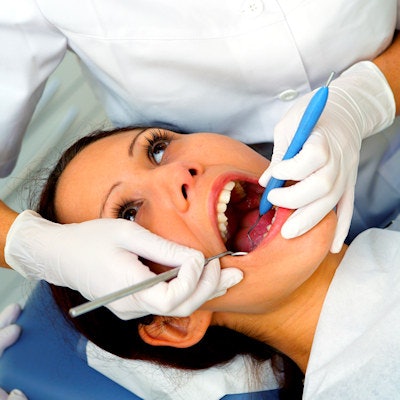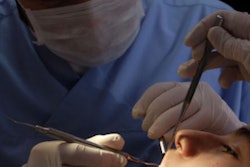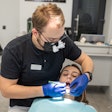
Expanding Medicaid dental benefits from emergency only to comprehensive coverage may correlate with more patients diagnosed with oral cancer sooner, according to a research letter published March 31 in JAMA Oncology.
Diagnosis of stage 0 and II oral cavity cancer (OCC) in California Medicaid patients increased 7 percentage points when dental benefits were expanded from emergency only to comprehensive services. However, early diagnoses fell 6.9 percentage points when dental benefits were cut from comprehensive to emergency services, the authors wrote.
"Comprehensive dental insurance was associated with localized presentation of OCC among California Medicaid beneficiaries between 2007 and 2016," wrote the authors, led by Dr. John D. Cramer of the Department of Otolaryngology - Head and Neck Surgery, Wayne State University School of Medicine in Detroit.
The five-year survival rate for localized oral cancer is 70% to 90% versus less than 50% for locoregionally advanced oral cancer. Therefore, early diagnosis is paramount. However, a lack of dental insurance is a barrier. Many adults, including 74% of Medicare beneficiaries, don't have coverage.
To examine whether changes in Medicaid dental insurance benefits in California were associated with changes in the presentation of cancer, researchers conducted a cohort study that included 10,318 patients diagnosed with oral cancer between 2007 and 2016.
From July 1, 2009, through January, 1, 2014, California Medicaid dental insurance was downgraded from comprehensive coverage to emergency-only coverage. Researchers compared changes in oral cancer diagnoses from before the comprehensive coverage was downgraded (January 2007-July 2009 versus January 2010-December 2013) and after comprehensive coverage was restored (July 2014-December 2016).
When dental benefits were cut from comprehensive to emergency only, California Medicaid recipients' diagnoses of oral cancer fell from 46.5% to 39.6%. The rates then rose again from 39.6% to 46.6% when benefits were expanded, Cramer et al wrote.
The study had limitations, including the economic recession from 2007 to 2009. Factors beyond change in dental coverage, such as changes in the Medicaid population with Medicaid expansion, were not considered in this study, the authors wrote.
"Nonetheless, our findings suggest that comprehensive dental coverage by national and state government-sponsored insurance is associated with the potential for early cancer detection," Cramer and colleagues concluded.



















